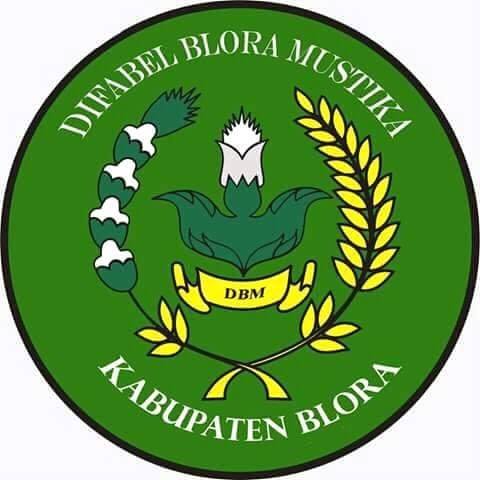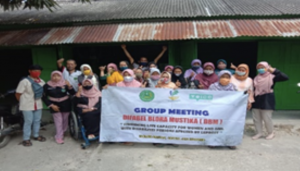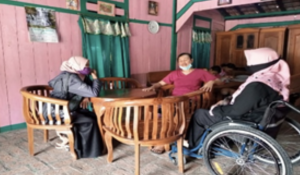Project
Strengthening Life Capacity for Women and Girls Affected by Leprosy
-
Amount Funded
24,903 EUROProject Duration
01 Nov 2019 - 31 Oct 2020 -
-
Lead organisation
Difabel Blora Mustika
-
Difabel Blora Mustika (DBM) increases the capacity and builds the character of its members through empowerment. DBM advocates for the Blora District Government in order to encourage sustainable policies and programmes to respect, protect and fulfill the rights of people with disabilities in Blora .
The main activities of DBM are:
- Engaging with the Blora district government in an effort to fulfill the same rights;
- Advocating and lobbying to stakeholders to encourage the realisation of the regional regulation on disability in Blora Regency;
- Conducting skills training for the economic independence of people living with disabilities and people affected by leprosy ;
- Conducting home visits for life motivation sessions as a means to support the elimination of stigma at the self and family levels.
-
Organisation
Difabel Blora Mustika (DBM) increases the capacity and builds the character of its members through empowerment. DBM advocates for the Blora District Government in order to encourage sustainable policies and programmes to respect, protect and fulfill the rights of people with disabilities in Blora .
The main activities of DBM are:
- Engaging with the Blora district government in an effort to fulfill the same rights;
- Advocating and lobbying to stakeholders to encourage the realisation of the regional regulation on disability in Blora Regency;
- Conducting skills training for the economic independence of people living with disabilities and people affected by leprosy ;
- Conducting home visits for life motivation sessions as a means to support the elimination of stigma at the self and family levels.
-
Project
The Strengthening Life Capacity for Women and Girls Affected by Leprosy is a socialisation and advocacy project that increases the knowledge and understanding of women with disabilities and/or leprosy as an effort to reduce community stigma and discrimination. The project is eliminating the negative perception in the community of Blora, Central Java, Indonesia through support from various parties and stakeholders which are significant in encouraging the regulation of policies related to women with disabilities and/or leprosy.
The project focuses on:
- Data collection on women with disabilities and women who have had leprosy in Blora, Central Java, Indonesia.
- Improving the advocacy capacity of women with disabilities and women who have had leprosy at the Blora District communication forum for persons with disabilities.
- Ensuring that there are policies that regulate the protection and fulfillment of the rights of women with disabilities and women who have had leprosy in Blora, Central Java, Indonesia.
- Increasing stakeholder understanding of the existence of women with disabilities and women who have had leprosy to be involved in policymaking through village level deliberations.
- Eliminating stigma and discrimination through socialisation and sensitivity training in the community.
- Improving the life skills of women with disabilities and women who have had leprosy to be more productive. Decreasing the rates of sexual abuse of women with disabilities and women who have had leprosy.
-
The Strengthening Life Capacity for Women and Girls Affected by Leprosy is a socialisation and advocacy project that increases the knowledge and understanding of women with disabilities and/or leprosy as an effort to reduce community stigma and discrimination. The project is eliminating the negative perception in the community of Blora, Central Java, Indonesia through support from various parties and stakeholders which are significant in encouraging the regulation of policies related to women with disabilities and/or leprosy.
The project focuses on:
- Data collection on women with disabilities and women who have had leprosy in Blora, Central Java, Indonesia.
- Improving the advocacy capacity of women with disabilities and women who have had leprosy at the Blora District communication forum for persons with disabilities.
- Ensuring that there are policies that regulate the protection and fulfillment of the rights of women with disabilities and women who have had leprosy in Blora, Central Java, Indonesia.
- Increasing stakeholder understanding of the existence of women with disabilities and women who have had leprosy to be involved in policymaking through village level deliberations.
- Eliminating stigma and discrimination through socialisation and sensitivity training in the community.
- Improving the life skills of women with disabilities and women who have had leprosy to be more productive. Decreasing the rates of sexual abuse of women with disabilities and women who have had leprosy.
-
Women and girls affected by leprosy often face numerous challenges in Indonesia as a whole and in the Blora Regency, Central Java, in particular. Key among these is the negative perception about these women and girls that has resulted in community stigma and discrimination against them.
Difabel Blora Mustika (DBM) is an organization that aims to increase the capacity and character of its members through empowerment. It also advocates for the Blora Regency Government to encourage sustainable policies and programs to respect, protect, and fulfill the rights of people with disabilities in Blora Regency.
DBM implemented the “Strengthening Life Capacity for Women and Girls Affected by Leprosy,” a socialization and advocacy project with the aim of increasing knowledge and understanding of living with disabilities and / or leprosy towards reducing community stigma and discrimination. It aimed to work for the realization of an inclusive society by improving the quality of life for women with disabilities including those who had experienced leprosy.
The intervention had three strategies- capacity building for women with disabilities, public awareness of families and communities, and evidence-based advocacy that was carried out with the relevant government authorities (social service, MSME service, and trade and industry office) to ensure economic empowerment for the rightsholder group. DBM’s approach was a twin track approach that involved not only preparing the rightsholder group but also the supporting environment and community.
Capacity building was carried out for women with disabilities (WWDs) including those who have experienced leprosy. DBM ensured that they were able to view life positively, were motivated and developed good resilience. The rightsholders were also equipped with rhetorical skills to be able to voice their interests and rights.
Public awareness was premised on the assessment that families, communities and the surrounding environment had not only the potential to hinder but also the potential to develop the rightsholder at the same time. Families and communities needed to have a positive perspective on WWDs, including those who have experienced leprosy, so that they would be better able to take on roles as part of the community without experiencing stigma and discrimination.
Evidence-based advocacy engaged WWDs including those who have experienced leprosy as agents of change who are able to carry out evidence-based and rights-based advocacy aimed at the government to access opportunities in economic development.
Gaining Confidence and Integrating into Society: The project has seen several positive outcomes. The WWDs who have participated in the project have increasingly gained confidence and understood the importance of joining the organization. Self-stigma has been reduced and the women have acquired a self-positive image that enables them to live independently.
Difabel Blora Mustika brought the data on WWD and/or leprosy to the local government as a part of their advocacy strategy and putting WWDs as leaders in conducting advocacy to voice out concerns of WWDs.
The project has enabled the community to begin accepting the existence of WWDs and women who have experienced leprosy and gradually making it open to involving WWDs in social activities. A discussion on how to reduce stigma brought together a total of 10 WWDs and women who have experienced leprosy and 20 community members. This activity was intended to be a starting point for public awareness on disability, reducing discrimination and opening up space for people with disabilities.
The Banjarejo village apparatus provided public access by providing a special budget for the empowerment of persons with disabilities. The empowerment program began with regular meetings to discuss the development of each person with a disability on how to overcome stigma. DBM also used the home visit approach and intense communication through training to impart skills in the manufacture of processed food, drinks, and handicrafts as well as online marketing training. These trainings included areas such as empowerment, strengthening women’s rights and gender equality, making crispy mushroom chips, development of tools for oyster mushrooms and catfish in a bucket, cooking, life skills, public speaking, etc.
While the project did achieve some results, more needs to be done regarding coordination with the village government to continue reducing levels of discrimination against WWDs and to provide space and empowerment for WWDs and women who have had leprosy.







